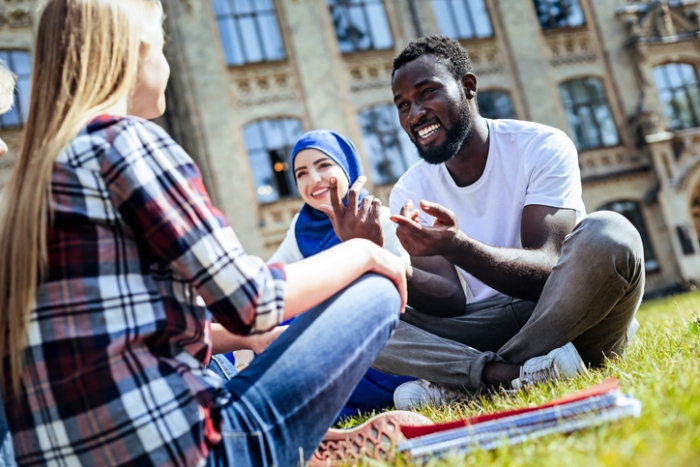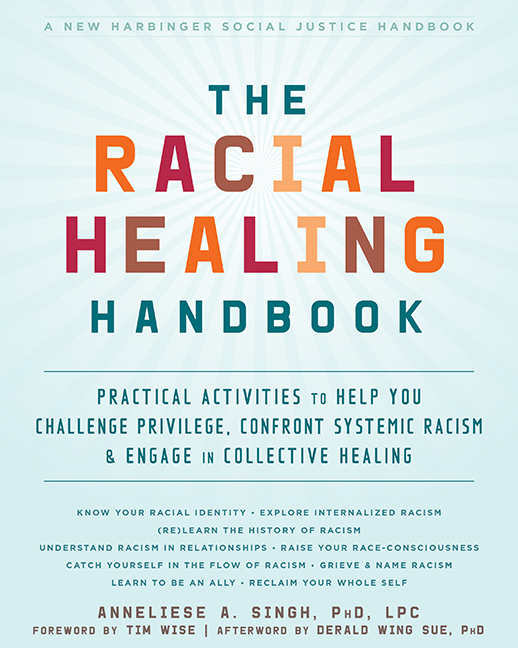By Anneliese Singh, author of The Racial Healing Handbook
Yes, most definitely. The good news is that healing from racism is a process of proactive individual actions and strategies you can practice throughout your lifetime. And the even better news is that as you begin to heal from racism, you can learn to give folks in your personal and professional circles the opportunity to heal from racism too.
What is Racial Healing, Exactly?
Racial healing means we begin to unlearn the stereotyped racial messages we internalized about our own race and the race of others. It means we, as individuals, learn to recognize the wounds that racism creates in us, whether we are White or a Person of Color. Healing means we open our eyes to the costs of racism, which are pretty much everywhere, and work to stop participating, either knowingly or actively, in the system of racism and White supremacy that was designed to favor some people and not others. We learn to notice how our race drives the differential privileges and access to needed resources we might receive, and we take action to change systems of racism.
Five Steps You Can Take Right Now for Racial Healing
-
Know Your Racial Identity – When it comes to your race, developing a positive racial identity is important (Neville and Cross 2017). It means you are secure in your racial identity, you are aware of the history of your racial group, and you are able to identify when you are being racially stereotyped. Notice that having a positive racial identity is very different from having an identity under White supremacy, an unjust system where one race is inferior to another. Rather, a positive racial identity means you have spent time learning about who you are as a racial being—both the privileges and the disadvantages that affords you—and how your racial identity affects your experience of others and the world. Think about it, what was the earliest time you realized you had a race? How did you figure this out? How do you feel about your racial identity today? We are often discouraged to reflect on these questions in the name of a color-blind approach to our racial identity, but knowing your racial identity is an important part of healing.
-
(Re)learn the History of Racism – If someone asked you when and where racism started, what would you say? It’s a tough and complicated question to answer, but it’s an important one for racial healing. Racism has been handed down many generations and infiltrates every part of our society whether we realize it or not. I know I read history books that never used the word “racism,” much less talked about how it worked. I had teachers who glossed over racist events, minimizing its lasting impact, like “Yep, bad stuff happened, but it’s all in the past.” Educating ourselves about the history of racism allows us to continuously seek to unlearn a color-blind approach to history, and learn the truth about how racist systems like enslavement and “becoming White” led to racial inequities we have in our society right now. (Re)learning the history of racism also prepares us to take collective action challenging racism in relationships and institutions (see #5 below).
-
Catch Yourself in the Flow of Racism – Because racism is pretty much everywhere, you will find yourself in racialized situations in school, work, family, and social settings. As much as you strive to raise your racial consciousness as a Person of Color or White person, you will unexpectedly find yourself in the “flow of racism.” What do you do when you notice racial microaggressions or macroaggressions? How do you challenge internalized racism in yourself or others? Knowing what these are is an important first step. Then, having a plan to respond and rehearsing that plan can help you shift your own attitudes and beliefs when you are witnessing or committing racial microaggressions and macroaggressions as a White person, or experiencing them as a Person of Color.
-
Be a Racial Ally – A racial ally is someone who actively supports others who are experiencing racial injustice, prejudice, and discrimination. If you are White, being a racial ally means that you use your White privilege to challenge everyday racism. Being a White racial ally means you have worked hard to become more attuned to the ways that racism can show up, overtly or covertly, within yourself and within your relationships. You signal to White friends and colleagues that you will take action to speak out and act when it comes to racism, and you signal to People of Color that you are an advocate. If you are a Person of Color, you may not have racial privilege, but you do have the opportunity to be a racial ally to yourself and other People of Color. For example, if in my work I become aware of a policy that contains covert racism that affects People of Color, I speak up against it. Whether I am successful or not in my advocacy, I signal to other People of Color that I am attuned to the ways racism can present itself. I also signal to White folks that I am a racial ally to myself—I won’t be silent when it comes to issues of race.
-
Engage in Collective Racial Healing – Healing from racism is best done in community with people who are committed to their own racial healing journey. I have developed a treasured and honest community of People of Color and White people in my life who will support me and help me stay accountable to my racial healing. Because racism is persistent and embedded in systems, and enacted by people, it is important to also develop racial justice communities to provide us with opportunities as White people and People of Color to participate in movements designed to reduce the impacts of racism and increase racial healing for larger communities of people.
So, healing from racism is not only possible, there are individual actions we can take right now to be an active part of dismantling racism, while doing some important healing in the process. These endeavors aren’t simple processes that will happen overnight, but they are processes you can start now, so we can be part of a generation of folks who did something about racism together.
Anneliese A. Singh, PhD, LPC, is a professor and associate dean of diversity, equity, and inclusion in the college of education at the University of Georgia. Singh is cofounder of the Georgia Safe Schools Coalition to work on reducing heterosexism, transprejudice, racism, and other oppressions in Georgia schools. She founded the Trans Resilience Project, where she translated her findings from nearly twenty years of research on trans people’s resilience to oppression into practice and advocacy efforts. She is author of The Queer and Transgender Resilience Workbook and The Racial Healing Handbook. She’s delivered widely viewed TEDx Talks, and recorded a podcast for the American Psychological Association on her research with transgender youth and resilience.



 2024 Peace Playbook: 3 Tactics to Avoid Clashes with Your Partner
2024 Peace Playbook: 3 Tactics to Avoid Clashes with Your Partner